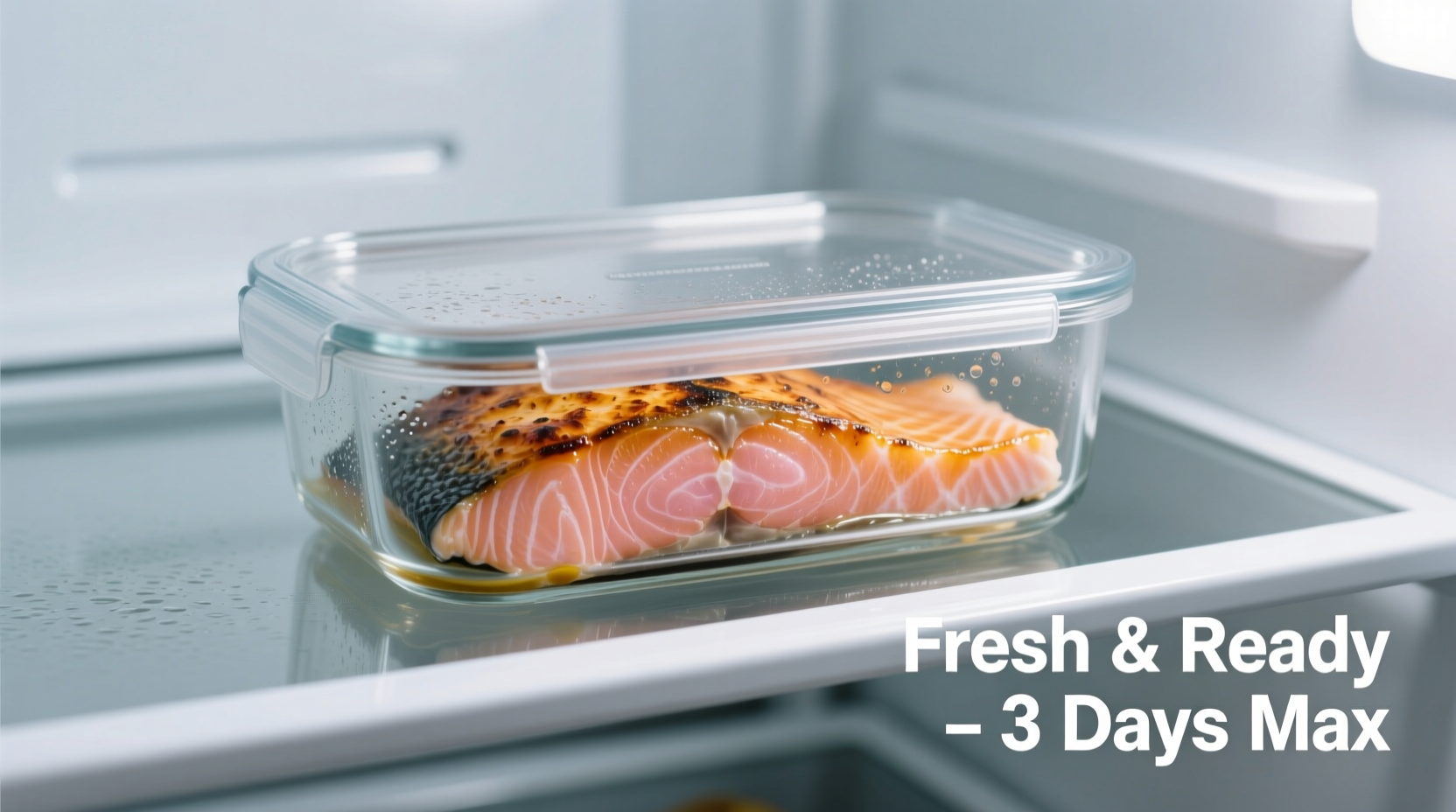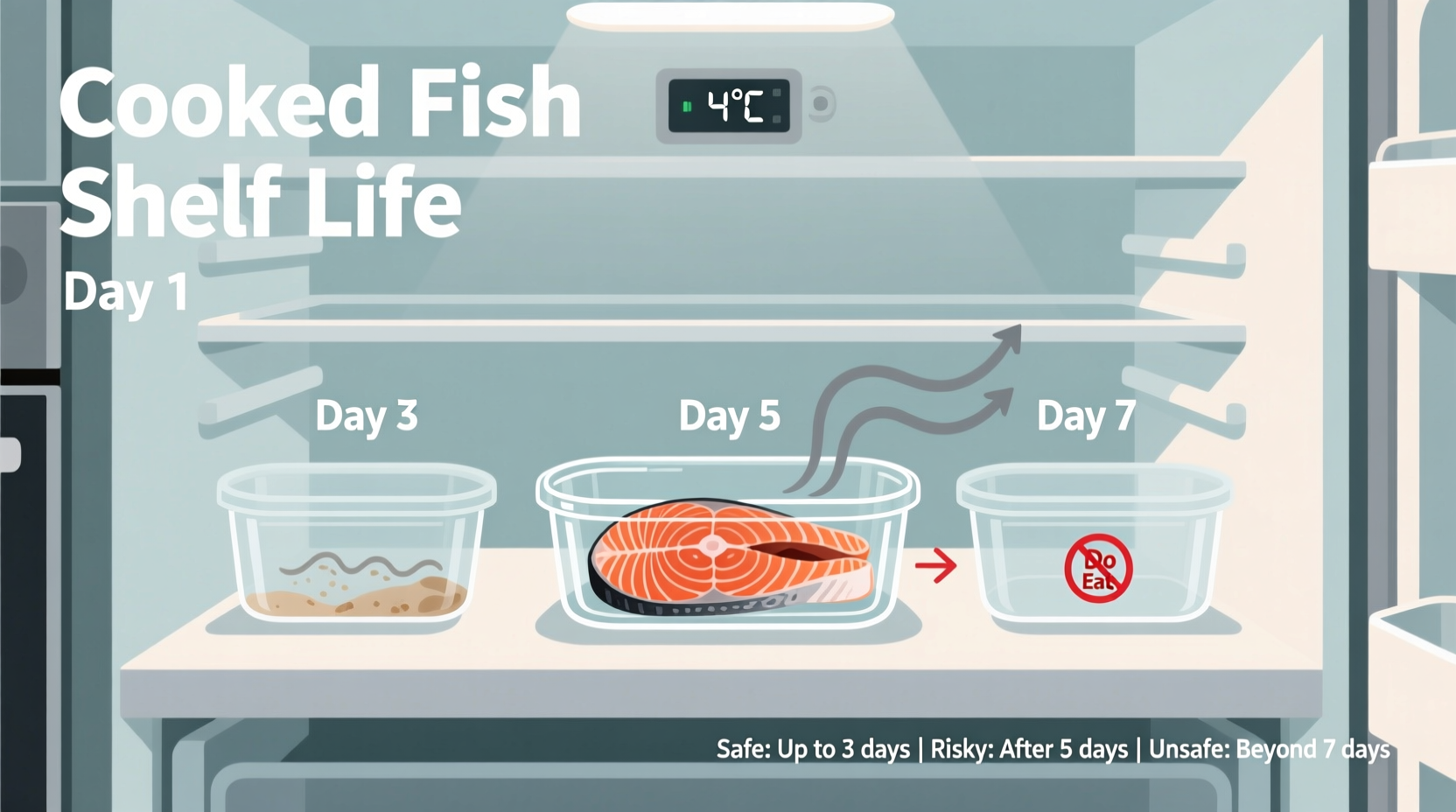When you're standing in front of your refrigerator wondering if last night's salmon dinner is still safe to eat, you need clear, trustworthy information immediately. As someone who's worked in professional kitchens for over 15 years, I've seen how crucial proper food storage is for both safety and quality. Getting this wrong isn't just about wasted food—it's about protecting your health and your family's well-being.
The Science Behind Fish Storage Safety
Fish spoils faster than many other proteins due to its delicate structure and high moisture content. Once cooked, fish enters what food safety experts call the "temperature danger zone" when cooled improperly. The USDA Food Safety and Inspection Service emphasizes that cooked fish should never be left at room temperature for more than two hours (or one hour if temperatures exceed 90°F).
| Type of Cooked Fish | Refrigerator Storage Time | Freezer Storage Time |
|---|---|---|
| Fatty fish (salmon, mackerel, trout) | 3 days | 2-3 months |
| Lean fish (cod, haddock, tilapia) | 3-4 days | 4-6 months |
| Shellfish (shrimp, crab, lobster) | 3 days | 2-3 months |
| Fish in sauce or with vegetables | 2-3 days | 2-3 months |
This comprehensive storage timeline comes directly from the USDA Food Safety and Inspection Service guidelines, which represent the gold standard for food safety information in the United States.
Your Step-by-Step Guide to Proper Cooked Fish Storage
Knowing how long cooked fish stays good is only half the battle—you must store it correctly to maximize safety and quality. Here's what professional kitchens do that most home cooks miss:
Immediate Cooling Is Critical
Don't let cooked fish sit on the counter to cool. The FDA Food Code specifies that cooked food should move from 140°F to 70°F within two hours and from 70°F to 40°F within an additional four hours. For fish, I recommend using an ice bath for faster cooling:
- Place cooked fish in a shallow container
- Set the container in a larger bowl filled with ice water
- Stir occasionally until cooled to room temperature (about 30-45 minutes)
- Transfer to airtight container before refrigerating
Airtight Containers Make the Difference
Using proper containers prevents cross-contamination and maintains moisture balance. Glass containers with locking lids work best, but high-quality plastic containers are acceptable. Never store cooked fish in the cooking pan—it continues to cook and creates condensation that accelerates spoilage.
How Spoilage Develops: The 4-Day Timeline
Understanding what happens to cooked fish during refrigeration helps you recognize when it's no longer safe. This timeline shows the microbial progression:
- Day 1: Bacterial levels remain low; fish maintains optimal texture and flavor
- Day 2: Initial bacterial growth begins; quality starts declining but remains safe
- Day 3: Bacterial count approaches safety threshold; quality noticeably decreases
- Day 4: Bacterial levels reach potentially hazardous levels; consumption risk increases significantly
- Day 5+: High risk of foodborne illness; discard immediately
This progression comes from research conducted by the USDA National Institute of Food and Agriculture, which monitors microbial growth in various food products under controlled conditions.
5 Clear Signs Your Cooked Fish Has Gone Bad
While the 3-4 day rule is reliable, always perform these sensory checks before consuming refrigerated cooked fish:
- Smell test: Fresh cooked fish has a mild ocean scent. If it smells sour, ammonia-like, or strongly fishy, discard it immediately.
- Texture check: Properly stored cooked fish maintains firmness. If it feels slimy or sticky to the touch, it's spoiled.
- Visual inspection: Look for discoloration (yellowing, fading, or darkening) or visible mold growth.
- Taste test (only if other signs are clear): If it tastes sour or bitter when you take a tiny taste, spit it out and discard the rest.
- Container check: Excessive liquid in the container or cloudy appearance indicates bacterial growth.

Special Considerations That Affect Storage Time
Certain factors can shorten the safe storage window for cooked fish. Be aware of these context boundaries that impact how long cooked fish stays good in the fridge:
- Fish type matters: Fatty fish like salmon spoil faster than lean fish like cod due to higher oil content
- Sauce impact: Fish in creamy sauces lasts only 2-3 days compared to plain cooked fish
- Cooking method: Grilled or baked fish stores better than fried fish, which has higher moisture absorption
- Refrigerator temperature: If your fridge runs above 40°F (check with a thermometer), reduce storage time by 24 hours
- Initial freshness: Fish that was near spoilage before cooking has a shorter refrigerator life after cooking
According to the Centers for Disease Control and Prevention, improper food storage causes approximately 48 million cases of foodborne illness annually in the United States. When in doubt about cooked fish safety, follow the chef's golden rule: "When uncertain, throw it out."
Maximizing Leftover Fish Quality
If you know you won't eat cooked fish within 3-4 days, freezing is your best option. For optimal results:
- Portion into single-serving sizes before freezing
- Remove air from freezer bags using the water displacement method
- Label with contents and date using freezer-safe markers
- Thaw overnight in the refrigerator, never at room temperature
Remember that freezing stops but doesn't reverse bacterial growth. Fish frozen after day 3 of refrigeration won't be safer than when it went into the freezer.
When Leftovers Become a Health Risk
Consuming spoiled cooked fish can cause scombrotoxin poisoning (histamine poisoning) or bacterial infections like listeria or salmonella. Symptoms typically appear within 30 minutes to 48 hours and include:
- Nausea and vomiting
- Abdominal cramps
- Diarrhea
- Headache and dizziness
- In severe cases, difficulty breathing or irregular heartbeat
Vulnerable populations—including pregnant women, young children, older adults, and immunocompromised individuals—face higher risks from consuming improperly stored fish. The FDA specifically warns that older adults are 23 times more likely to be hospitalized from listeria infections than healthy adults.
Practical Tips for Busy Home Cooks
Make food safety part of your routine with these simple habits:
- Store leftovers within 2 hours of cooking (1 hour if kitchen is warm)
- Use the "first in, first out" method—place new leftovers behind older ones
- Keep a small whiteboard on your fridge listing contents and dates
- When reheating, ensure fish reaches 165°F internally
- Never taste food to determine if it's still good—rely on the 3-4 day rule and sensory checks
Frequently Asked Questions
Can I eat cooked fish after 5 days in the refrigerator?
No, cooked fish should not be consumed after 5 days in the refrigerator. The USDA Food Safety and Inspection Service recommends discarding cooked fish after 3-4 days, as bacterial growth reaches potentially hazardous levels beyond this timeframe. Even if the fish appears and smells normal, it may contain dangerous pathogens.
Does reheating cooked fish make it safe to eat after 5 days?
No, reheating does not make spoiled cooked fish safe to eat. While proper reheating (to 165°F) can kill some bacteria, it doesn't eliminate toxins already produced by bacterial growth. These heat-stable toxins can cause food poisoning even after thorough reheating. Always follow the 3-4 day rule for cooked fish storage.
How can I tell if cooked fish has gone bad if I can't smell it?
If you have a reduced sense of smell, check for other spoilage signs: slimy texture, discoloration (yellowing or fading), cloudy liquid in the container, or sour/bitter taste (spit out immediately if detected). When in doubt, follow the 3-4 day rule regardless of sensory indicators, as dangerous pathogens may be present without obvious signs.
Does freezing cooked fish reset the 3-4 day refrigerator clock?
No, freezing cooked fish does not reset the refrigerator storage clock. Freezing pauses but doesn't reverse bacterial growth. If you freeze cooked fish on day 3, it remains safe for the same total timeframe as if continuously refrigerated. For best quality, consume frozen cooked fish within 2-3 months for fatty fish or 4-6 months for lean fish.
Can I store different types of cooked fish together in the same container?
It's not recommended to store different types of cooked fish together. Each fish variety has different oil content and moisture levels that affect spoilage rates. Mixing them creates inconsistent storage conditions and increases cross-contamination risk. Store each type separately with its own date label to ensure proper consumption within the appropriate timeframe.











 浙公网安备
33010002000092号
浙公网安备
33010002000092号 浙B2-20120091-4
浙B2-20120091-4